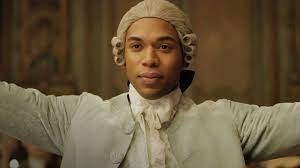Chevalier 2023 Movie Review
Though his life and accomplishments were largely erased under Napoleon, the extraordinary figure at the center of Stephen Williams’ “Chevalier” really did exist. Born on the Caribbean island of Guadeloupe, the son of a white plantation owner and his Black slave, Joseph Bologne went on to excel in spheres rarely accessible to people of color in 18th-century French society. Here was a champion swordsman and celebrated musician invited to play his violin at Versailles, where Marie Antoinette reportedly accompanied him on the harpsichord.
So why has it taken so long for his story to be told?
The time certainly seems right to rediscover the Chevalier — an honorary title that reveals how high Bologne rose under France’s overtly racist Code Noir, as well as a fitting name for the film. A compelling example of Black excellence dating back even before the French Revolution, the English-language “Chevalier” doesn’t feel nearly as fusty as its powdered wigs and period setting might suggest. Like “Chocolat” (not the Johnny Depp confection, but the 2016 Omar Sy vehicle about the circus clown who broke barriers on the Paris stage), this modern-minded if occasionally under-nuanced costume drama fills a historic gap, starting with its fanciful opening scene: a violin showdown between Bologne (Kelvin Harrison Jr.) and Wolfgang Amadeus Mozart (Joseph Prowen) choreographed like a rap battle.
It’s an imaginative bit of one-upmanship with which to begin, as “Chevalier” puts Mozart in the Salieri position to make its point (in real life, Bologne was more than a decade older than the Austrian composer, though the two would have surely been aware of one another’s talents). Perhaps the most remarkable thing about “Chevalier” is how many of Bologne’s actual feats it leaves out (including his impressive military record). And perhaps the most frustrating is that the film takes enough creative liberties along the way that audiences can never be sure how much of what they’re seeing is true.
That makes “Chevalier” less a definitive portrait than a fascinating departure point for further reading and research. Williams comes to the project having helmed the wrenching Tulsa Race Massacre episode of HBO’s “Watchmen.” There, he brought into the light a horrific chapter of Black history. Made on what appears to be a fraction of the budget, disguised in part by DP Jess Hall’s dynamic camerawork, “Chevalier” poses a different but comparable challenge: How to do justice to a respected 18th-century composer when so much of his music has been lost? (In a shameful reversal of Enlightenment progress, three years after Bologne’s death, Napoleon reinstated slavery, and his work was banned.)
Williams turns the fact his work was suppressed into a strength, freeing the film to modernize both Bologne’s own music and the original neoclassical score that surrounds him. To that end, the director engaged two composers: Kris Bowers (“Green Book”), who gives the film its contemporary musical signature, and Michael Abels (“Get Out”), who updated and expanded what survives of Bologne’s oeuvre, including the Violin Concerto No. 9, which the character defiantly performs in the film’s dramatic climax.
“Chevalier” focuses primarily on an earlier chapter in Bologne’s career, when the Creole multitalent — a musical virtuoso adept at fencing and riding and poetry, raised and educated as a free man — sought the open position as head of the Paris Opera. In real life, Bologne’s ambitions were thwarted when three leading ladies of the opera signed a petition refusing to answer to someone of mixed ancestry. “Chevalier” combines that devastating setback with several other important details from his biography, the most compelling of which were his dangerous liaisons with one Marie-Josephine (Samara Weaving), married to the powerful Marquis de Montalembert (Marton Csokas).
In the film, Marie Antoinette (played as frivolous and fickle by Lucy Boynton) sanctions a contest whereby Bologne and his rival Christoph Gluck (Henry Lloyd-Hughes) for the Paris Opera post must each compose an original opera in order to determine who gets the job. Bologne goes to work writing “Ernestine,” enlisting the supportive Madame de Genlis (Sian Clifford) as sponsor, while insisting on Marie-Josephine as his muse and star — a risky move for myriad reasons. Doing so makes an enemy of opera diva La Guimard (Minnie Driver). “They are all extremely jealous of your very large … talent,” she flirts from beneath her mile-high wig, changing her tune after he rejects her none-too-subtle proposition.
Between the cartoonish way that white characters telegraph their bigotry and Harrison’s sly implication that Bologne isn’t trying to “pass” so much as parody the French elite, the movie veers precariously close to camp at times. Like the drag balls in “Paris Is Burning,” each courtly bow and effete hand flourish could be read as a kind of mockery, until such point that Bologne catches his own mother (Ronkẹ Adékoluẹjo) laughing at the way he carries himself. “You look like a white boy,” she teases, amplifying an identity crisis already well underway.
Under the Code Noir, French society can never fully accept Bologne as one of its own, and so “Chevalier” becomes at once a critique of insincere allyship and a reminder for ambitious outsiders not to abandon their culture en route to the success they seek. In the film, when Bologne hits rock bottom, the solution is for him to reconnect with his roots, playing drums alongside a group of Black street musicians. His silly white wig serves as a symbol of his self-discovery, cast aside when it comes time to make his stand.
It’s a powerful scene, bolstered by Bologne’s own music. But do audiences care enough about the internal politics of French opera to turn out for this film, or would “Chevalier” have done better to focus on another chapter of the man’s incredible but true life story?




